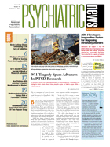Distinct neural correlates underlie the behavioral phenomena of frustration and irritability and appear to distinguish a subgroup of children who experience severe and disabling irritability that may constitute a diagnostic entity distinct from bipolar disorder (BD).
Research using magnetoencephalography to analyze neural responses to irritation, elicited by a computerized task rigged to block attainment of goals and thus produce frustration, found that children with "severe mood dysregulation" (SMD) exhibited neural responses that were distinct from those exhibited by children with bipolar disorder. Specifically, the children with SMD reported greater irritation in response to the computerized task than did healthy children or children with bipolar disorder, and they responded to negative feedback with significantly greater activation of the anterior cingulate cortex and medial frontal gyrus.
The study was published online in the June 8 Journal of Psychiatric Research.
Study co-author Ellen Leibenluft, M.D., told Psychiatric News that the findings provide further neurobiological evidence of a psychiatric condition distinct from bipolar disorder and defined by symptoms of severe and chronic irritability, persistent sadness and anxiety, hyper-arousal, and a consistent tendency to respond to frustration in developmentally inappropriate ways.
Leibenluft noted that children with these symptoms are often diagnosed with bipolar disorder despite not having the clearly demarcated episodes of mania that characterize bipolar disorder.
"The study is further evidence that children with SMD and children with bipolar disorder are different," she said. "We already have data indicating that children with SMD differ from those with bipolar disorder in terms of longitudinal course and family history. And now this research shows that, at least in the context of this study, the children with SMD exhibited more irritability in response to frustration than did children with bipolar disorder" (see
Key Findings).
She is chief of the Section on Bipolar Spectrum Disorders at the National Institute of Mental Health (NIMH) and a member of the DSM-5 Childhood Disorders Work Group.
The term severe mood dysregulation was developed by Leibenluft and her research group at NIMH, and criteria for the syndrome are being tested in field trials for DSM-5. In a paper published in AJP in Advance on December 1, 2010, Leibenluft outlined criteria, longitudinal data from community and clinical studies, and family history, as well as preliminary data on possible neurobiological mechanisms for the syndrome (Psychiatric News, January 21).
In the new study, 60 children aged 8 to 17 (20 with SMD, 20 with bipolar disorder, and 20 healthy youth) were administered the "affective Posner paradigm." It is a computerized test of basic attention, which in the current study involved rewards for correct answers in the form of small amounts of money, but in later stages of the task was also rigged to block success and detract from the child's earnings.
Magnetoencephalography was used to examine neuronal activity following both negative and positive feedback. The researchers also examined reaction time, response accuracy, and self-reported affect.
"What we found is that while playing the frustrating game, both the children with SMD and the children with bipolar disorder were more unhappy than the healthy children, but the self-report of those with SMD indicated they were significantly more agitated than the children with bipolar disorder," said lead author Brendan Rich, Ph.D., an assistant professor in the Department of Psychology at Catholic University in Washington, D.C.
Moreover, the frustration and irritation elicited by the task produced distinct neural responses in the children with SMD and those with bipolar disorder. Compared with youth with bipolar disorder and healthy youth, those with SMD responded to negative feedback with significantly greater activation of the anterior cingulate cortex, and they also had greater activation of the medial frontal gyrus than did healthy children.
In contrast, children with bipolar disorder displayed greater superior frontal gyrus activation and decreased insula activation than either of the other two groups following negative feedback.
Interestingly, the anterior cingulate cortex and medial frontal gyrus—both hyperactivated in children with SMD following negative feedback—were the same areas activated in healthy control children following positive feedback.
Rich explained that these regions are believed to modulate an individual's experience of emotional stimuli, and the findings suggest that for children with SMD, negative feedback is more "salient," causing them to respond more intensely to that feedback than others.
The finding points to intriguing therapeutic possibilities. "It makes you think about cognitive training or therapies that could perhaps train children with SMD to pay greater attention to positive feedback and less attention to negative feedback," Liebenluft said.
The research was funded by the Intramural Research Program at NIMH.

